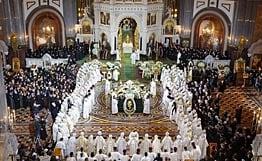
Yesterday was the funeral service for the patriarch of the Russian Orthodox Church, Alexy II, who died of a heart attack at age 79. According to RIA, the patriarch is “credited with leading a revival of the Church after the fall of communism.” He officially became patriarch in 1990. As he came to lead the Church before the fall of the Soviet Union, Alexy II was responsible for the religious revival in Russia that came after the fall of Communism and state imposed atheism. For this reason, much of his legacy is actually quite political. RIA, for example, has also pointed out “his open support for fellow orthodox Serbs during the Kosovo conflict” and the AP has discussed his lobby for the “1997 passage of a religion law that places restrictions on the activities of religions other than Orthodoxy, Islam, Judaism and Buddhism.” The aim actually appeared to be that all Russian Christians would be under the control of Moscow and the Orthodox Church. This caused some tensions with the Pope, particularly as the Orthodox Church was concerned about the numbers of conversions to Catholicism. Looking at the current political situation in Russia, the most relevant questions after the passing of Alexy II concern the degree to which the Orthodox Church helped influence extreme Russian nationalism.